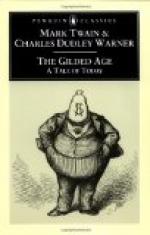“I will think of it, and let you know soon. But still, there is very little likelihood that I—however, we will not discuss it further now.”
“Remember, that the sooner we get to work the better, Miss Hawkins, public curiosity is so fickle. Good day, madam.”
The close of the trial released Mr. Harry Brierly and left him free to depart upon his long talked of Pacific-coast mission. He was very mysterious about it, even to Philip.
“It’s confidential, old boy,” he said, “a little scheme we have hatched up. I don’t mind telling you that it’s a good deal bigger thing than that in Missouri, and a sure thing. I wouldn’t take a half a million just for my share. And it will open something for you, Phil. You will hear from me.”
Philip did hear, from Harry a few months afterward. Everything promised splendidly, but there was a little delay. Could Phil let him have a hundred, say, for ninety days?
Philip himself hastened to Philadelphia, and, as soon as the spring opened, to the mine at Ilium, and began transforming the loan he had received from Squire Montague into laborers’ wages. He was haunted with many anxieties; in the first place, Ruth was overtaxing her strength in her hospital labors, and Philip felt as if he must move heaven and earth to save her from such toil and suffering. His increased pecuniary obligation oppressed him. It seemed to him also that he had been one cause of the misfortune to the Bolton family, and that he was dragging into loss and ruin everybody who associated with him. He worked on day after day and week after week, with a feverish anxiety.
It would be wicked, thought Philip, and impious, to pray for luck; he felt that perhaps he ought not to ask a blessing upon the sort of labor that was only a venture; but yet in that daily petition, which this very faulty and not very consistent young Christian gentleman put up, he prayed earnestly enough for Ruth and for the Boltons and for those whom he loved and who trusted in him, and that his life might not be a misfortune to them and a failure to himself.
Since this young fellow went out into the world from his New England home, he had done some things that he would rather his mother should not know, things maybe that he would shrink from telling Ruth. At a certain green age young gentlemen are sometimes afraid of being called milksops, and Philip’s associates had not always been the most select, such as these historians would have chosen for him, or whom at a later, period he would have chosen for himself. It seemed inexplicable, for instance, that his life should have been thrown so much with his college acquaintance, Henry Brierly.
Yet, this was true of Philip, that in whatever company he had been he had never been ashamed to stand up for the principles he learned from his mother, and neither raillery nor looks of wonder turned him from that daily habit had learned at his mother’s knees.—Even flippant Harry respected this, and perhaps it was one of the reasons why Harry and all who knew Philip trusted him implicitly. And yet it must be confessed that Philip did not convey the impression to the world of a very serious young man, or of a man who might not rather easily fall into temptation. One looking for a real hero would have to go elsewhere.




